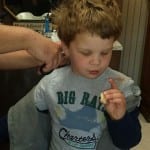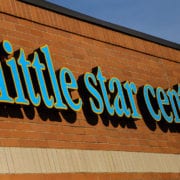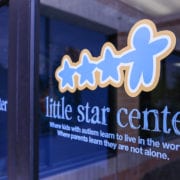Written by a Little Star Center employee
I grew up with my older brother. Mom, dad, me and my brother. We were as close as two brothers could be growing up. My mom stayed home with us until we went to school. Everything was very typical, I didn’t know any different. We would play blocks, trucks, roughhousing and make believe. It wasn’t until my brother left for kindergarten. I remember walking with mom to the bus stop and watching my brother get on the bus for school.
I was sad at first. This was the first time I would be away from my brother ever, at all. I learned later in life that when my brother went to school, a different side of him was shown. My brother, who played with me like a typical kid, didn’t play with anyone in kindergarten. In fact, my brother didn’t do much of anything. He sat in a corner, away from all of his peers. My brother displayed his first signs of Asperger Syndrome, extreme social anxiety in a new setting.
I didn’t know when he got home that he had such a rough time at school. He was my brother like I always knew him, back in the safety and security of our home. My parents were made aware of his difficulties, and he repeated kindergarten. My brother, being the brilliant human being that he is, surely saw that he didn’t meet their social expectations year one, so made sure of it come year two. My brother progressed into elementary school as if nothing was wrong. He did well academically and even made a handful of friends, some of which he still has to this day.
It wasn’t until late elementary school that a teacher noticed some of my brother’s difficulties and suggested that he be tested for high-functioning autism. In the mid 90’s my brother was diagnosed with Asperger Syndrome. This was difficult for me to hear, as you could imagine, being a 10 year-old boy and hearing your brother has a**burgers? I was quickly told the correct spelling and was told that it was a high functioning form of autism.
We went to a parent meeting one evening at our elementary school so my parents could receive some literature on my brother’s newly discovered syndrome. My brother and I played in the gym with some of the others kids and siblings. We quickly noticed how out of place we were. My brother was not like these children, we could both see that. After that night, little was said about my brother’s Asperger’s or about the fact that he had autism. But my curiosity had been peaked. My brother was always just a little quirky and odd to me. It never was anything deficient about him. In fact, I always admired his ability to block out social distractions and focus on his studies and academic pursuits.
I was curious and, as it turned out, I would spend the rest of my time in school taking every psychology class I could get my hands on. I studied psychology in college as well as counseling and philosophy. I wanted to help others and change the world.
After college, life sent me to residential care for children with autism. I finally felt as though I had answered my calling. I was working with a population I had been around my whole life. Little did I realize that my brother was very similar to the kids in that gymnasium all those years ago. Just a little quirky and different when it came to communicating with others. But just as brilliant and loving as my brother. I love my brother and this lesson that he taught me so early in life: An inability to express one’s self in accordance with society’s standards does not make you less, it just makes you different. It has been my pleasure working with children with autism and helping the world see their brilliance and love, even if it’s not what they’re expecting to see. And I have my brother to thank for that.
This post was written by an employee at Little Star Center who has requested to remain anonymous.
 One of our learners at Little Star Center-Bloomington has been working on hair cutting desensitization with his therapist. Getting to the stage where he is comfortable sitting for a haircut has been a gradual process which included allowing the therapist to touch his hair, sitting in the waiting area and touching the styling chair. The learner has been able to sit back in the styling chair at our center for two minutes without any unwanted behaviors!
One of our learners at Little Star Center-Bloomington has been working on hair cutting desensitization with his therapist. Getting to the stage where he is comfortable sitting for a haircut has been a gradual process which included allowing the therapist to touch his hair, sitting in the waiting area and touching the styling chair. The learner has been able to sit back in the styling chair at our center for two minutes without any unwanted behaviors! Recently, he and his therapist visited a local barber shop to sit in a styling chair. He successfully sat in the chair and allowed his therapist to trim his hair!
Recently, he and his therapist visited a local barber shop to sit in a styling chair. He successfully sat in the chair and allowed his therapist to trim his hair!



